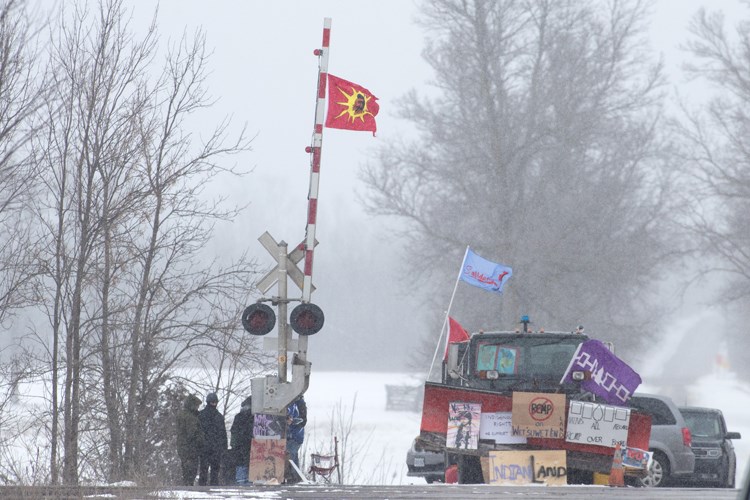A railway blockade in New Hazelton is coming down, according to the senior media relations officer for the B.C. RCMP.
Protestors had been blocking the rail line connecting Prince George and Prince Rupert since Feb. 6, in solidarity with a group of Wet'suwet'en hereditary chiefs and their supporters who had been blockading construction of the Coastal GasLink pipeline. The New Hazelton blockade was one of three across the country, with another in Belleville, Ont. and one near Winnipeg, Man.
"It is my understanding that a peaceful resolution has been reached in New Hazelton and the blockade is in the process of being removed by the protesters," RCMP Staff Sgt. Janelle Shoihet said via email. "I don't have a timeline as to when this will be completed."
The B.C. and federal governments have agreed to meet with Gitxsan and Wet'suwet'en hereditary chiefs to discuss a blockade near New Hazelton, B.C.
Gitxsan hereditary chief Norm Stephens said the blockade will be dismantled during the talks but if the province doesn't agree to cancel Coastal GasLink's permit then it may go back up.
Coastal GasLink has signed agreements with all 20 elected band councils along the pipeline route but the Wet'suwet'en hereditary chiefs say councils only have authority over reserve lands, not traditional territories that have never been ceded through a treaty.
"They got that permit by consulting with the band council," said Stephens. "They have no authority on the hereditary chiefs' land."
On Wednesday CN Rail announced it is shutting down all Eastern Canada railway operations until the illegal blockades are permanently removed. Likewise VIA Rail announced Wednesday it is shutting down all routes except one commuter route in Ontario and the railway serving Churchill and The Pas, Man.
The railway blockades are putting Canada's economy at risk Cariboo-Prince George MP and opposition critic for the Asia-Pacific Gateway Todd Doherty said.
"It's absolutely shocking we've allowed it to get this far," Doherty said. "We're a trading nation, these blockades have frozen our economy. This is our national supply chain that is being attacked."
Doherty said he's concerned the agenda of "a small group of activists" is being misrepresented as the desire of the entire Wet'suwet'en people – all five elected Wet'suwet'en councils have signed benefit agreements in support of the project.
"First and foremost we have to listen to the real voices of the Wet'suwet'en. They value the project for economic prosperity and jobs and building capacity in their communities," Doherty said.
Doherty said he's seen interviews with several Wet'suwet'en leaders who were concerned that many of the people at the blockade weren't Wet'suwet'en people.
"These are paid protestors who are promoting violence," Doherty said.
If the protests are allowed to remain in place, it will embolden others to do the same thing, he added.
In a statement issued on Wednesday, CN Rail said it has court orders to remove the blockades but they haven't been enforced in Ontario.
"CN sought and obtained court orders and requested the assistance of enforcement agencies for the illegal blockades in Ontario, Manitoba and British Columbia," the statement said. "While the illegal blockades have come to an end in Manitoba and may be ending imminently in British Columbia, the orders of the court in Ontario have yet to be enforced and continue to be ignored."
The blockades could continue to have a serious economic impact in Prince George and northern B.C. by disrupting shipments of lumber, pulp, paper and wood pellets to market.
“Canfor is seeing restricted rail car capacity that has been impacting our supply chain," Canfor director of communications Michelle Ward said in an email. "The rail disruption has implication for our lumber and pulp business, which have already dealt with downtime, as well as our pellet operations.”
B.C. Council of Forest Industries president and CEO Susan Yurkovich said in an email the organization is trying to assess the damage from the rail disruptions.
"Forest products make up about 10 (per cent) of all rail traffic that moves through Western Canada, and in many cases, our members’ operations are in areas where rail service is the only economic transport option," Yurkovich said. "As such, any disruption to rail service that impedes our ability to serve our customers around the world will adversely impact B.C. forest companies at a time when we are already facing significant challenges and increasing competition from across the globe.”
In a press release, Teamsters Canada – the nation's largest transportation union – called for the federal government to intervene and end the blockades.
“These blockades are having a catastrophic impact on ordinary, working-class Canadians who have nothing to do with the Coastal GasLink pipeline," Teamsters Canada national president François Laporte said. "Hundreds of our members have been out of work close to week. Now up to 6,000 of our members risk not being able to support their families or make ends meet this month, and they are powerless to do anything about it."
In a statement published on Facebook on Wednesday, members of the Unist'ot'en camp said they have no interest in dialog or ending the fight.
"Canada invades. Invades on behalf of industry," the statement said. "We have had enough. Enough dialogue, discussion, negotiation at the barrel of a gun. Canada comes to colonize. Reconciliation is dead. It is time to fight for our land, our lives, our children, our future. Revolution lives."
— With files from The Canadian Press



